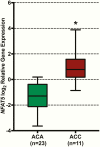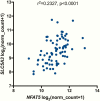Recurrent Amplification of the Osmotic Stress Transcription Factor NFAT5 in Adrenocortical Carcinoma
- PMID: 32587934
- PMCID: PMC7304660
- DOI: 10.1210/jendso/bvaa060
Recurrent Amplification of the Osmotic Stress Transcription Factor NFAT5 in Adrenocortical Carcinoma
Abstract
Tumorigenesis requires mitigation of osmotic stress and the transcription factor nuclear factor of activated T cells 5 (NFAT5) coordinates this response by inducing transcellular transport of ions and osmolytes. NFAT5 modulates in vitro behavior in several cancer types, but a potential role of NFAT5 in adrenocortical carcinoma (ACC) has not been studied. A discovery cohort of 28 ACCs was selected for analysis. Coverage depth analysis of whole-exome sequencing reads assessed NFAT5 copy number alterations in 19 ACCs. Quantitative real-time PCR measured NFAT5 mRNA expression levels in 11 ACCs and 23 adrenocortical adenomas. Immunohistochemistry investigated protein expression in representative adrenal samples. The Cancer Genome Atlas database was analyzed to corroborate NFAT5 findings from the discovery cohort and to test whether NFAT5 expression correlated with ion/osmolyte channel and regulatory protein expression patterns in ACC. NFAT5 was amplified in 10 ACCs (52.6%) and clustered in the top 6% of all amplified genes. mRNA expression levels were 5-fold higher compared with adrenocortical adenomas (P < 0.0001) and NFAT5 overexpression had a sensitivity and specificity of 81.8% and 82.7%, respectively, for malignancy. Increased protein expression and nuclear localization occurred in representative ACCs. The Cancer Genome Atlas analysis demonstrated concomitant NFAT5 amplification and overexpression (P < 0.0001) that correlated with increased expression of sodium/myo-inositol transporter SLC5A3 (r 2 = 0.237, P < 0.0001) and 14 other regulatory proteins (P < 0.05) previously shown to interact with NFAT5. Amplification and overexpression of NFAT5 and associated osmotic stress response related genes may play an important role adrenocortical tumorigenesis.
Keywords: Adrenocortical carcinoma; NFAT5; Osmotic Stress; and SLC5A3.
© Endocrine Society 2020.
Figures






References
-
- Tella SH, Kommalapati A, Yaturu S, Kebebew E. Predictors of survival in adrenocortical carcinoma: an analysis from the national cancer database. J Clin Endocrinol Metab. 2018;103(9):3566-3573. - PubMed
-
- Megerle F, Kroiss M, Hahner S, Fassnacht M. Advanced adrenocortical carcinoma - what to do when first-line therapy fails? Exp Clin Endocrinol Diabetes. 2019;127(2-03):109-116. - PubMed
Grants and funding
LinkOut - more resources
Full Text Sources
